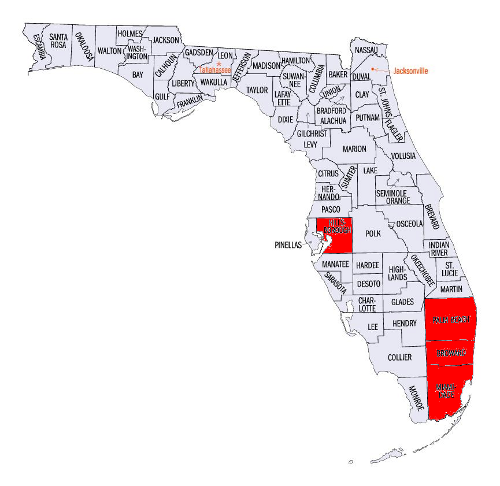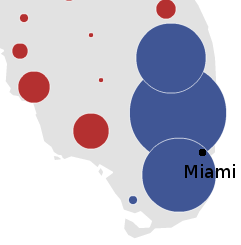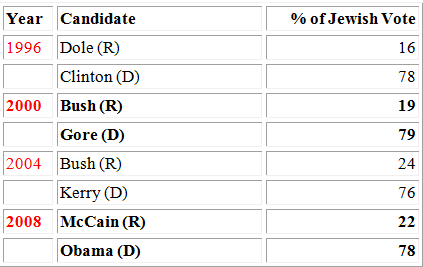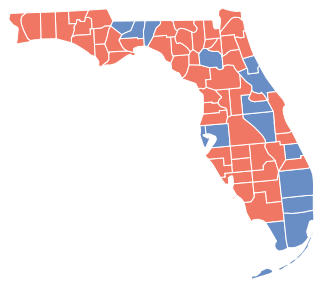I do most of my writing at the Iowa progressive community blog Bleeding Heartland.
Last year at this time I was scrambling to make as many phone calls and knock on as many doors as I could before the Iowa caucuses on January 3.
This week I had a little more time to reflect on the year that just ended.
After the jump I’ve linked to Bleeding Heartland highlights in 2008. Most of the links relate to Iowa politics, but some also covered issues or strategy of national importance.
I only linked to a few posts about the presidential race. I’ll do a review of Bleeding Heartland’s 2008 presidential election coverage later this month.
January 2008
The Iowa caucuses dominated the beginning of the year. In the ninth and final diary in my series on how the Iowa caucuses work, I responded to arguments in defense of what I consider flaws in caucus system.
I supported John Edwards and was impressed by some of Hillary Clinton’s campaign tactics, but on the whole January 3 was obviously Barack Obama’s night.
Chris Woods posted some early analysis of the Iowa caucus results. Barack Obama won 41 counties, John Edwards won 29 counties, Hillary Clinton won 25 counties and four counties were ties.
I was frustrated by my failure to secure a third delegate for Edwards in my precinct.
Chris Woods lamented the Iowa mainstream media’s lack of interest in political blogs.
Iowa Republicans were already downbeat about their election prospects, having failed to recruit a credible candidate against U.S. Senator Tom Harkin. Republicans in the state legislature fell behind Iowa Democrats in fundraising.
I was hoping the legislature would put some balance in our state’s transportation planning, but the powers that be wanted to spend virtually all the new money on road-building.
Secretary of State Mike Mauro did us all a favor by proposing a bill to require paper ballots in every Iowa precinct.
I took a stab at explaining why Iowa has never elected a woman governor or sent a woman to Congress.
Yet another study confirmed that runoff from conventional farms in Iowa is a major contributor to the “dead zone” in the Gulf of Mexico.
Former Governor Tom Vilsack called for more action to combat global warming.
Noneed4thneed called for more leadership from Chet Culver on conserving energy and making Iowa the renewable energy capital.
A report by the American Wind Energy Association showed Iowa falling to fourth in wind power.
Environmental advocates arranged for world-class expert testimony before the Iowa Utilities Board against a proposal to build a new coal-fired power plant near Marshalltown.
Ed Fallon announced his candidacy for Congress, and I explained why I planned to support him against six-term incumbent Leonard Boswell in the third district primary.
I was a respondent in a long poll commissioned by Boswell’s campaign, which tested some of Fallon’s messages against the incumbent.
I called for fixing the problems with the Iowa caucuses and learned that the Nevada Democratic Party adopted slightly better caucus rules than ours. (Unfortunately, precinct chairs in Nevada were poorly-trained, and the caucuses were a fiasco in many precincts.)
I was disappointed when Edwards dropped out of the presidential race, even though I knew he had no chance of winning the nomination.
February 2008
What started out as a routine illness put me in the hospital for a week. Things might have taken a very bad turn if I had waited longer before seeing a doctor. I told the story here: My health insurance may have saved my life.
Noneed4thneed discussed the connection between anti-tax zealots and local roads that are in terrible condition.
Renewable Rich sounded the alarm about attempts by state legislators to define nuclear power as a form of renewable energy. Fortunately, that bill was not approved.
The Iowa Commission on the Status of Women supported a bill that would make it easier for working mothers to breastfeed. Unfortunately, the bill did not make it out of committee in the Iowa House.
Senator Tom Harkin stayed neutral in the Clinton-Obama contest and said the Democratic Party should eliminate superdelegates from the presidential nominating process.
I was already getting tired of safe incumbent Harkin’s repeated fundraising appeals, and there were dozens more to come before the year was over.
Democracy for America endorsed Ed Fallon in the third district Congressional primary.
Boswell was among 21 House Democrats who worked with Republicans to do George Bush’s bidding on the Foreign Intelligence Surveillance Act. But he stepped up his constituent outreach by helping my suburb, Windsor Heights, secure a unique zip code.
Fourth district Congressional candidate Kurt Meyer started posting diaries occasionally at Bleeding Heartland.
Secretary of State Mauro ran into opposition from Chet Culver over his efforts to require that all voting machines use paper ballots. However, the governor soon got behind a plan to eliminate touchscreen voting machines.
I argued that a new law requiring all Iowa children to be tested for lead is worth the cost, not only because lead harms children. It seems that exposure to lead may diminish the functioning of the aging brain decades later.
Iowa joined California’s lawsuit against the Environmental Protection Agency “for its legal action which denied states’ rights to adopt vehicle emissions standards to regulate global warming emissions.”
Iowa State Senator Matt McCoy paid a fine to settle an ethics investigation.
Noneed4thneed alerted us to a corporate-funded advertising campaign targeting five first-term Iowa House Democrats. (Four of the five won re-election in November, but Art Staed lost by a heartbreaking 13 votes.)
I reflected on a year without Steve Gilliard, whose News Blog I used to read daily.
March 2008
Governor Culver rejected federal funds that had strings attached to require “abstinence only” sex education.
The Republican 501(c)4 group Iowa Future Fund ran untruthful ads against Culver without disclosing its donors, but Iowa law does not require political ads to be true.
In a party-line vote, the Iowa House rejected a Republican effort to bring a constitutional amendment banning gay marriage up for debate.
Tom Harkin introduced the Complete Streets Act of 2008 in the Senate.
Congressman Steve King of the fifth district made his infamous comment about how terrorists would be “dancing in the streets” if Obama were elected president.
The National Republican Congressional Committee’s list of top House targets did not include any of Iowa’s Democratic-held seats.
Ed Fallon came out against new coal-fired power plants proposed for Marshalltown and Waterloo, while Boswell declined to take a position on the issue.
Boswell used his franking privilege to send glossy campaign-style flyers to voters in the third district, and the Des Moines Register called him on it.
Boswell defended his vote for the bankruptcy bill, which was unpopular with many liberal Democrats.
Boswell also changed his stand on the Foreign Intelligence Surveillance Act and touted his record on supporting the middle class.
A national LGBT rights group endorsed Fallon.
Boswell’s campaign sent out a mass e-mail saying Fallon is “no Democrat.”
I explained why I thought Fallon would be a more effective representative than Boswell.
Fourth district Congressional candidate William Meyers started posting diaries here and continued to do so throughout the primary campaign.
Noneed4thneed encouraged Bleeding Heartland readers to support first-term Democrats in the Iowa legislature who were targets of a corporate-funded advertising campaign.
A report from Families USA estimated how many Iowans die prematurely because they lack health insurance.
I wrote about the disparities in c-section rates in Iowa, depending on where a woman lives and in which hospital she births.
Speaking of babies, I gave some reasons to use cloth diapers.
April 2008
A Polk County judge ordered Secretary of State Mauro to stop providing voter information in languages other than English, proving that the English-only bill Governor Tom Vilsack signed in 2002 was more than symbolic.
Chet Culver signed the law banning touchscreen voting machines in Iowa.
Our state’s Republican representatives in the U.S. House, Steve King and Tom Latham, voted against a federal bill on verified voting.
After reviewing voter records, the Des Moines Register concluded that very few ineligible voters participated in the Iowa caucuses.
The U.S. House approved a “plain language” bill sponsored by Congressman Bruce Braley of the first district.
I discussed how much money in earmarks each member of Iowa’s Congressional delegation secured in 2007.
The Iowa legislature approved a major new transportation bill without putting additional funds into public transit or stipulating that road money be spent on fixing existing infrastructure.
I urged Culver to veto a bill seeking more study of the livestock odor problem instead of action, but he signed it.
The legislature also approved a ban on smoking in most public places, with a few exemptions, such as casino gambling rooms.
I suggested 10 ways for smokers to stop whining about the smoking ban.
Mrs panstreppon speculated about the political ambitions of Bruce Rastetter, a businessman and funder of the anti-Democratic 501(c)4 group Iowa Future Fund. The Iowa Future Fund had been running television ads attacking Chet Culver.
Mrs panstreppon also wrote about the new Republican 501(c)4 group Iowa Progress Project, which was created to replace the Iowa Future Fund.
The Des Moines Register razzed Culver for staying at Bill Knapp’s Florida condo without paying the full market rental rate.
I wrote a four-part series on the Boswell campaign’s efforts to question Fallon’s ethics and explored the differences between Fallon and Boswell on farm issues.
Progressive Kick created an entertaining website highlighting Boswell’s voting record in Congress.
Fallon blasted Boswell’s vote for the Military Commissions Act, which gave the president the authority to determine what interrogation techniques are “torture.”
Boswell’s campaign sent out positive direct-mail pieces on the economy, Iraq and health care. His campaign also sent two direct-mail pieces in one week highlighting Fallon’s support for Ralph Nader in 2000. I transcribed them here and here.
Polk County voters rejected a plan to borrow money to build a new courthouse.
A sign that the housing bubble had well and truly burst: Iowa’s largest home-builder ceased operations and laid off its entire staff.
Mixed-use developments are good for people, business and the environment.
I weighed in on a local hot topic when Pizza Hut fired a Des Moines delivery driver who shot an alleged armed robber. (The restaurant chain does not allow drivers to carry guns.)
In honor of cesarean awareness month I wrote about how to avoid having an unnecessary surgical birth.
I advised readers to drink tap water, but not from plastic bottles and to avoid using baby bottles containing bisphenol-A.
On the last day of the month the Iowa Utilities Board approved an application to build a new coal-fired power plant near Marshalltown.
May 2008
I was extremely disappointed that the Democrats on the Iowa Utilities Board voted to approve a new coal-fired power plant.
I weighed in on why Hillary Clinton lost Iowa and eventually the nomination.
An article by Joe Trippi got me speculating on whether John Edwards should have stayed in the presidential race longer.
Tom Harkin gave some reasons to be concerned about John McCain, and I added ten more reasons not to vote for the Republican nominee.
I discussed why John and Jackie Norris were important early Obama supporters in Iowa and pondered which presidential candidate had the best celebrity supporters.
The removal of Lurita Doan as head of the General Services Administration reminded me of one of Bruce Braley’s finest moments in Congress.
Governor Culver signed into law a bill that establishes a statewide 1-cent sales tax for school infrastructure.
Prevention First discussed the Healthy Families project’s successful attempt to persuade state legislators to increase funding for family planning.
Sadly, no prominent Iowa Democrat stood up for repealing Iowa’s English-only law.
I welcomed the prospect of a court challenge against the smoking ban exemption granted to casinos.
A Des Moines Register report on the Culver administration’s alleged horsetrading with lobbyists was troubling.
In the fourth district primary, Becky Greenwald introduced herself to Democrats as “the girl next door.”
As the third district Democratic primary race heated up, Fallon highlighted his early opposition to the war in Iraq and portrayed himself as “new energy for Iowa.” He also urged Boswell (a Clinton supporter) to endorse Obama for president.
Fallon and Boswell clashed over ethanol, and Fallon called for a moratorium on new confined animal feeding operations (CAFOs).
Boswell refused all invitations to debate Fallon.
He highlighted Al Gore’s endorsement in direct mail and reminded voters that Fallon backed Nader.
Noneed4thneed argued that Boswell is not a loyal Democrat on the issues that matter most.
A 527 group bankrolled by a central Iowa developer accused Fallon of not protecting kids from sex offenders, not supporting ethanol producers, and not protecting kids from sex offenders (yes, there were two dishonest direct-mail pieces on Fallon’s vote against residency restrictions for sex offenders).
The Southeast Iowa Lutheran Synod showed real leadership on global warming.
The Union of Concerned Scientists and the Pew Commission on Industrial Farm Animal Production published damning reports on conventional livestock production in the U.S.
An editorial by James Howard Kunstler on “Driving Toward Disaster” inspired this post on how to reduce Americans’ vehicle-miles traveled by car.
In honor of asthma awareness month, I suggested 10 ways to combat asthma.
I paid tribute to my friend and fellow activist LaVon Griffieon on Mother’s Day.
I gave parents some ideas about good books to read to children.
June 2008
June 3 was primary day in Iowa. I wrote up Boswell’s final radio ad as well as his campaign’s pathetic attempt to portray Fallon as unconcerned about meth.
I received two push-polls targeting Iowa House district 59 candidate Jerry Sullivan.
On election day Becky Greenwald easily won the four-way primary in the fourth Congressional district, while Boswell easily defeated Fallon in the third district. Mariannette Miller-Meeks narrowly won the Republican primary in the second district. Christopher Reed barely edged out two Republican rivals for the chance to get crushed by Tom Harkin.
Although Boswell wiped out Fallon by 20 points, I still believe the primary challenge was worth the effort. (At least my suburb got its own zip code.)
I urged unsuccessful fourth district candidate William Meyers not to make the mistake of running for Congress as an independent.
After Republicans nominated Miller-Meeks and Democrats nominated Greenwald, I again discussed some reasons why Iowa has never elected a woman to Congress.
I was confident that the third district Congressional race would not be competitive in the general election.
Dubuque and the Quad Cities moved one step close to passenger rail, thanks to work by Bruce Braley on the House Transportation Committee.
Activists for organized labor in Iowa were still mad at Chet Culver two months after he vetoed a bill that would have expanded collective bargaining rights.
I started making the case for supporting fifth district Democratic candidate Rob Hubler against “Jackass Award” winner Steve King.
Meanwhile, King chastised Scott McClellan for revealing misconduct inside the Bush White House.
Bleeding Heartland readers weighed in on potential future leaders in the Iowa Democratic Party.
Chris Woods examined the relationship between climate change and the Iowa floods and offered his take on how Iowa should pay for flood recovery.
I advocated an investigation into why the Des Moines levee that failed was never fixed after the 1993 floods.
I was taken aback by some conservative bloggers’ views on flood relief and discussed our disagreements here and here.
Also in connection with the historic flooding, I urged readers not to use chlorine bleach to clean flood-damaged surfaces and not to use DEET-based mosquito repellents.
Noneed4thneed called attention to a report on how special interests spent big money to influence Iowa lawmakers.
The Iowa Values Fund seems not to have been good value for the taxpayers’ money.
I disagreed with Iowa Utilities Board members who argued that meeting future electricity needs will require more coal or nuclear power.
Less than three weeks after winning the primary, Leonard Boswell voted with House Republicans to approve the new version of the Foreign Intelligence Surveillance Act.
Chris Woods explained what was wrong with the FISA “compromise.”
Iowa Voter informed us that Chuck Grassley misled a town hall meeting audience on FISA. I linked to a bunch of commentaries on Obama and the FISA bill.
Opponents of the public smoking ban annoyed me when they called the new law “Soviet” or “fascist.” Anyway, fears about the smoking ban’s impact on business were unfounded.
The US Department of Agriculture in effect told honeybees to drop dead.
I learned from noneed4thneed that Marshalltown passed an ordinance to reduce the use of plastic bags.
After reading a diary by nyceve on how insurance companies punish women who have had cesarean births, I posted more advice for pregnant women seeking to reduce their risk of having a c-section.
I had some friendly advice for Obama volunteers on how to talk to non-supporters about Obama.
I posted my take on what any Democrat should do if you get push-polled or message-tested.
July 2008
News that the Obama campaign would be running the GOTV operation in Iowa made me worried about the potential effect on down-ticket Democrats. (Sadly, the election results validated several of my concerns.)
AlanF cross-posted this excellent piece on tips for volunteers who knock on doors for a political candidate.
I offered readers five reasons to get involved in state legislative races.
Senator Tom Harkin held an online voting contest to determine which Democratic statehouse candidates would receive contributions from his campaign fund.
Second district incumbent Dave Loebsack signed on to a letter urging Congress to address transportation issues in forthcoming legislation on climate change.
Relations between Senator Chuck Grassley and social conservatives in the Republican Party of Iowa had seen better days. Some of the tension stemmed from Grassley’s inquiry into the tax-exempt status of some television-based ministries.
Leonard Boswell spent two weeks in the hospital after having surgery.
Becky Greenwald criticized fourth district incumbent Tom Latham for his loyal Republican voting record on Iraq and other issues.
I argued that Greenwald had a real chance to beat Latham, but the incumbent’s money advantage would be her biggest obstacle.
Latham put up a statewide radio ad on the need for more off-shore oil drilling.
I contrasted Bruce Braley’s record of delivering for his constituents with Steve King’s.
King kept making offensive comments regularly and showed that he has no interest in genuine Congressional oversight.
SW Iowa Guy, a fifth district resident, gave us a window onto a conference call with King.
Joe Trippi signed on as a consultant to Rob Hubler’s campaign.
A particularly horrible Associated Press story on how “Pet owners prefer McCain over Obama” inspired this post on confounding variables in opinion polling.
I posted Four comments and a question on the bad blood between Culver and organized labor.
Markos Moulitsas bashed me on the front page of Daily Kos.
I shared some thoughts on a new advocacy group seeking to repeal Iowa’s public smoking ban.
Iowa environmental groups encouraged state regulators to make utilities do more on energy efficiency.
I went over some reasons to buy local.
One of my occasional posts on parenting laid out some reasons to “wear your baby”.
August 2008
The revelation of John Edwards’ affair stirred up conflicting feelings for me, as for many other former Edwards volunteers. I posted ten words I thought I would never write and a precinct captain’s reflections on the Edwards story.
Edwards’ political career may be over, but his presidential campaign’s slogan lived on.
After getting more fundraising appeals from Tom Harkin (whose Republican challenger had only a few hundred bucks in the bank), I advocated a Use it or Lose it campaign to encourage safe Democratic incumbents to give more money to Democratic campaign committees.
Jason Rosenbaum asked readers to contact their representatives in Congress on health care.
Former Republican Congressman Jim Leach endorsed Obama for president. Leach later addressed the Democratic National Convention and headlined numerous “Republicans for Obama” events.
I suggested five ways Bleeding Heartland readers could help Rob Hubler’s campaign against Steve King.
Giant chickens started showing up outside King’s campaign events after he refused to debate Hubler.
I felt a special legislative session to deal with flood relief was warranted, but it never happened.
The Cedar Rapids-based Rebuild and Grow organization offered its own flood recovery action plan.
The Iowa Fiscal Partnership released a report on why property tax cuts are the wrong approach for flood relief.
Chuck Grassley made some shameful comments favorably contrasting flood victims in Iowa to the victims of Hurricane Katrina.
Unfortunately, conventional agriculture interests trumped environmental concerns on the state’s flood recovery panel.
I posted some thoughts on how to reform the Democratic presidential nominating process.
I was impressed after attending one of the Obama campaign’s outreach events for women.
I argued that Joe Biden would be a good surrogate for Obama.
A conservative baby-sitter helped introduce my five-year-old to the concept of political pluralism.
Comparing the presidential campaigns’ ground games, I became convinced that Obama’s small-town outreach would crush McCain’s.
I posted a few questions on factors that could skew polls of the Obama-McCain race.
Caught up in the excitement of the Democratic National Convention, I finally gave some money to Obama’s campaign.
I was immediately convinced that Sarah Palin would become McCain’s gift to Democrats and noted that not all evangelical conservatives were thrilled with her candidacy.
Chet Culver criticized labor practices at the Agriprocessors meat-packing plant in a newspaper editorial, and the company responded.
I discussed another failure of employer-based health insurance as Whirlpool “filed a lawsuit in federal court seeking to cut the medical benefits of thousands of retired Maytag workers.”
A well-known political scientist at the University of Iowa took his own life while under criminal investigation for allegedly giving students higher grades in exchange for sexual favors.
Planned Parenthood of Greater Iowa warned about a proposed Bush administration regulation that would restrict access to contraception. (The administration implemented that new rule in December.)
I was annoyed that my son’s public school encouraged parents to buy Tyson chicken products.
Marvin Pomerantz, one of the most influential Iowa Republicans in the last 40 years, passed away.
September 2008
As September began I was thankful Iowa’s first Congressional district was not competitive, freeing me of the responsibility to write most posts on the idiot who ran against Bruce Braley.
Obama started running radio ads on abortion in Iowa and several other states.
American007 posted this excellent summary of Sarah Palin’s record in Wasilla.
Montana Governor Brian Schweitzer headlined Tom Harkin’s Steak Fry, but Lieutenant Governor Patty Judge gave the most memorable speech of the day.
The Democratic Congressional Campaign Committee put IA-04 on the list of “emerging races” and declared IA-05 a “race to watch.”
EMILY’s List finally endorsed Becky Greenwald two days after I posted this piece wondering why they hadn’t done so already.
The following week Greenwald went up on tv with a biographical ad that depleted her campaign coffers while doing little to boost her support.
Tom Latham’s first television ad highlighted his big “achievement” on health care: co-sponsoring a bill that never made it out of committee. Greenwald’s campaign exposed Latham’s real record on health care in a press release, but unfortunately lacked the cash to put up a response on television.
I saw Latham’s ad as proof that he expected a big Democratic wave and was positioning himself accordingly on traditionally “Democratic” issues.
Tom Harkin posted this diary on McCain’s “crusade against renewable fuels.”
There was plenty of hypocrisy on both sides of the aisle when the U.S. House passed an energy bill designed to give Democrats cover on the offshore oil drilling issue.
I again encouraged readers to get involved in the Iowa statehouse races.
While the presidential election still looked like a tossup, I discussed what would happen if neither candidate received 270 electoral votes.
I made the case for voting early here and here.
Annoyed by the fundraising appeals I kept getting from safe Democratic incumbent Leonard Boswell, I asked Bleeding Heartland readers to tell Boswell to give more to the Democratic Congressional Campaign Committee.
I argued that Democrats can win and hold districts like Iowa’s fifth. (Unfortunately, Hubler was not among the Democratic challengers who won deep-red Congressional seats this year, most notably in Maryland’s first and Colorado’s fourth districts.)
As a Democratic wave election appeared more likely, I wondered which Democratic pickups would shock us the most. (As it turned out, the most surprising pickup was probably in Virginia’s fifth Congressional district. We also had surprisingly narrow losses in California’s fourth and 44th districts.)
I thought labor unions were right to focus their political spending on the Iowa statehouse races and withhold contributions to Chet Culver’s re-election campaign for now.
The Sierra Club created an online petition for Iowans urging energy providers to invest in clean sources for electricity generation, not coal.
Environmental groups called on utilities to do more to save energy.
Renewable Rich summarized a report showing how clean energy can create thousands of new jobs in Iowa.
I went over some ways to improve the Iowa caucus system.
A grassroots group in Cedar Rapids organized volunteers every weekend for flood recovery work.
An advocate for factory farms stepped down from the state Environmental Protection Commission.
Former John Deere employees filed a class-action lawsuit in Des Moines that underscored the failures of our employer-based health insurance system.
I called for ending Iowa’s “don’t ask, don’t tell” approach to water quality.
I had a feeling that the Wall Street bailout was a terrible idea and “a trap that will enrich a bunch of people while doing little to help the overall economy.”
There was a highly contentious election for the Des Moines school board, followed by an ill-advised attempt to censure the black sheep of the board. I found the lack of oversight on the Des Moines School Board disturbing.
A newspaper article on an abstinence club at my old high school inspired this post on why even abstaining teens need comprehensive sex eduction.
I explained why Iowa native Justin Roberts is our family’s favorite children’s musician.
October 2008
All three Iowa Democrats in the U.S. House voted for the second version of the Wall Street bailout package, while Iowa’s two Republicans voted no. The bailout became a central issue in Tom Latham’s campaign advertising after Becky Greenwald unwisely said she would have voted for the revised bailout package. Senators Harkin and Grassley both voted for the bailout.
I offered some advice to disappointed party activists on What to do when you don’t care for your party’s nominee. Bleeding Heartland user lorih followed up by explaining why she started volunteering for Obama despite her deep disappointment that Clinton did not win the nomination.
I continued to speculate on factors that might affect the accuracy of polls on the presidential race.
The third quarter Federal Election Commission filings showed all the incumbents in Iowa’s Congressional delegation with big money leads over their challengers, foreshadowing the double-digit victories all the incumbents posted a few weeks later.
I kept urging our safe Democratic incumbents to “Use it or Lose it” by donating some of their excess campaign cash to the Democratic Congressional Campaign Committee or the Democratic Senatorial Campaign Committee.
Although I considered the second district race uncompetitive, I covered some key issues and events in Dave Loebsack’s campaign against Mariannette Miller-Meeks.
Again I examined the reasons underlying Iowa’s failure to elect a woman to Congress.
Bleeding Heartland supported the Obama campaign’s strong push for Iowa Democrats to vote early (including an early voting RV tour). As it turned out, strong early voting saved several Democratic statehouse incumbents.
Tom Latham debated Becky Greenwald twice on the radio during October; I analyzed the candidates’ performance in the debates here and here.
Latham ran tv ads pounding Greenwald on the bailout, while the Democrat (lacking money for tv) had to make do with web ads and press releases highlighting Latham’s record on various issues.
Not long after the Democratic Congressional Campaign Committee upgraded the races in IA-04 and IA-05, I urged Bleeding Heartland readers to get serious about expanding the field by supporting under-funded longshot Democratic Congressional challengers.
Steve King continued to embarrass himself and all Iowans.
Although the outcome wasn’t what I’d hoped for, I have no regrets about encouraging Democrats to back Rob Hubler’s campaign.
Speaking of longshots, little-known Republican Senate candidate Christopher Reed blew it in his only debate with Tom Harkin.
Harkin gave more cash to the Democratic Senatorial Campaign Committee. His campaign also launched a contest where Iowans could nominate county party organizations that deserved extra money for GOTV efforts. (Marion, Muscatine and Linn counties ended up winning.)
Mark Langgin urged Bleeding Heartland readers to support Democratic candidates for the Iowa House in light of a Republican focus on the House races.
The Republican 501(c)4 group American Future Fund exploited loopholes in rules governing political advocacy groups in order to run campaign advertising in targeted Iowa House districts.
The perils of leaving any Republican unopposed were exposed when news emerged that an incumbent Iowa senator with no Democratic challenger had previously been charged with a prostitution-related crime.
The Iowa Democratic Party kept producing videos on why McCain would be bad for Iowa.
I was puzzled by John McCain and Sarah Palin’s visits to Iowa late in the campaign, despite poll after poll showing Obama above 50 percent in Iowa, with a double-digit lead over McCain. In fact, a series of missteps by McCain got me wondering whether the Republicans should have nominated Mitt Romney.
The not-so-classy McCain used the Iowa floods in his campaign’s robocalls and direct-mail pieces.
Polk County Democratic activists gained national attention by holding a clothing drive for the DAV across the street from a Palin rally in Des Moines.
I went over some tips for phone bankers trying to recruit volunteers.
I supported a referendum on taking the word “idiot” out of the Iowa Constitution. (There was no organized opposition to that referendum, and it passed easily.)
For the first time in my life, the Des Moines Register endorsed the full slate of Iowa Democrats running for Congress. Ed Fallon urged his supporters to vote for Boswell in an e-mail that linked to the Register’s incredibly lukewarm endorsement of the incumbent.
Obama made one last stop in Des Moines shortly before election day.
Iowa Voter noted that the Brennan Center gave Iowa high marks for election readiness.
Jason Rosenbaum contributed this guest post on why health care reform matters. Rosenbaum was involved with the Health Care for America Now Coalition, which kept up the grassroots pressure on Senator Chuck Grassley to support universal health care.
I attended a commitment ceremony for a same-sex couple who had gotten married in California a few months earlier.
November 2008
Obama won Iowa convincingly, but his 9-point margin was smaller than the 17-point lead he had in the final Des Moines Register poll of the campaign.
Democratic gains down-ticket were somewhat disappointing in Iowa, as in quite a few other states.
I looked at some reasons why Becky Greenwald lost to Tom Latham by more than 20 points in the fourth Congressional district.
It was weeks before recounts finally confirmed net Democratic gains of three seats in the Iowa House and two seats in the Iowa Senate.
Unsuccessful Congressional candidate Rob Hubler criticized the statewide GOTV effort in an e-mail to supporters. Hubler’s son lost an Iowa House race by only a few hundred votes in the Council Bluffs area.
I was particularly disappointed when Democrat Jerry Sullivan lost in my own district by fewer than 100 votes. He had been the target of negative advertising as well as last-minute robocalls and lit drops.
In the good news column, Democratic incumbent Eric Palmer won re-election in his House district despite Republican attempts to disenfranchise Grinnell College students who voted by absentee ballot.
Jackie Norris accepted an offer to become Michelle Obama’s chief of staff.
The presidential election results convinced Josh Goodman of Governing.com that Iowa is now the best bellwether state.
Likely future Republican presidential candidates Mike Huckabee and Bobby Jindal reached out to social conservatives while visiting Iowa.
Meanwhile, the divided Republican Party of Iowa began work on turning the party’s electoral fortunes around by replacing its leaders in the Iowa House and the Iowa Senate.
I suspect Democrats would benefit if Iowa Republicans take the advice of a leading social conservative.
Some Iowa Democrats grumble about Governor Culver, but I argued here that their discontent will not rise to the level of a primary challenge in 2010.
Bruce Braley played an active and visible role in Henry Waxman’s successful campaign to be named chairman of the House Energy and Commerce Committee.
Stranded Wind sounded the alarm about the risk of famine in 2009.
A blogger’s struggle to pay medical bills inspired this post on the need for comprehensive health care reform. Our immoral and ineffective health care system was also the subject of this post.
I was surprised to learn that the Blog Gender Analyzer thinks I’m a man, a topic I explored further in this post at MyDD.
Wisconsin rejected an application to build a new coal-fired power plant, prompting the Iowa Environmental Council to call on Iowa policy-makers to follow the lead of “neighboring states to the west, north, and now east, which have concluded that clean energy makes more economic sense than coal.”
I owned up to a few things I got wrong and right during the long presidential campaign.
December 2008
Tom Vilsack’s nomination for Secretary of Agriculture was big news in Iowa. I covered the reaction to that appointment here and here.
The Iowa Supreme Court heard oral arguments in Varnum v Brien, a same-sex marriage case. jpmassar walked us through some of the legal issues at hand, and I discussed the political implications of the court ruling expected sometime next year.
A week later I posted a recap and analysis of the Varnum v Brien hearing and reaction to it.
Deteriorating revenue projections prompted Governor Culver to impose two rounds of budget cuts. I discussed the merits of some approaches to balancing the budget here.
Culver’s announcement of $100 million in budget cuts the same day he had scheduled a $5,000 a head fundraiser inspired me to make the case for “clean elections” campaign financing.
Speaking of election reform, Sean Flaherty and I wrote about the importance of “verified voting.”
The Democratic leadership in the state legislature released the committee assignments for the Iowa House and the Iowa Senate.
I discussed Congressional Quarterly and Progressive Punch rankings for the members of Iowa’s Congressional delegation in 2008.
Bruce Braley announced plans to form a Populist Caucus and landed a spot on the powerful House Energy and Commerce Committee.
I examined how the post-census reapportionment is likely to play out in the 2012 U.S. House races in Iowa.
Organic farming is carbon sequestration we can believe in.
There is no such thing as “clean coal.”
Bleeding Heartland user American007 won our election prediction contest.
I wondered whether it matters who ends up running the Republican Party in Iowa and nationwide.







